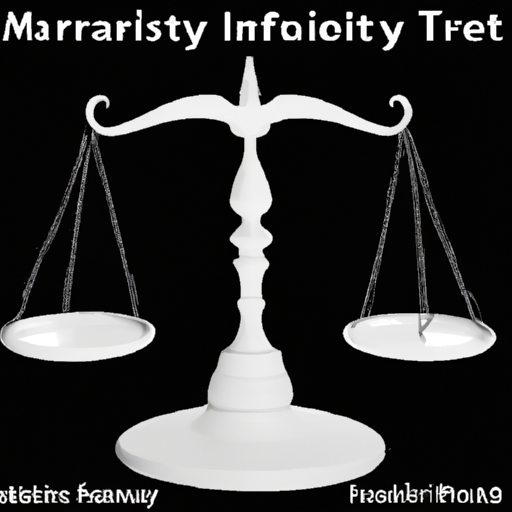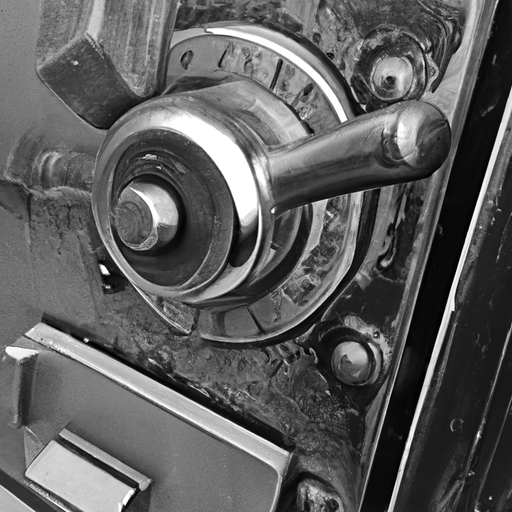In today’s competitive business landscape, protecting your intellectual property is crucial. Whether you are a start-up looking to secure your unique ideas or an established company with a portfolio of patents, trademarks, or copyrights, consulting with an experienced intellectual property lawyer is essential. For businesses in Murray, Utah, one name stands out: the Intellectual Property Lawyer Murray Utah. With a deep understanding of intellectual property law and a track record of successfully representing businesses and business owners, this lawyer is well-equipped to handle a wide range of IP issues. From conducting trademark searches to drafting licensing agreements, they provide comprehensive legal services tailored to your specific needs. With their expertise and personalized approach, you can have peace of mind knowing that your valuable intellectual assets are in capable hands.
The Importance of Intellectual Property Law
In today’s fast-paced and highly competitive business landscape, protecting your intellectual property is crucial for the success and longevity of your company. Intellectual property refers to intangible assets that are the result of human creativity and innovation, such as inventions, designs, trademarks, and copyrights. These assets are often the driving force behind a company’s competitive advantage and can significantly contribute to its value. Therefore, it is essential to understand the role of intellectual property law and why businesses need an intellectual property lawyer.
What is Intellectual Property?
Intellectual property encompasses a broad range of intangible assets that are created by individuals or businesses. It includes inventions, trademarks, trade secrets, copyrights, and designs. These assets give individuals and businesses exclusive rights to use and exploit their creations, which can provide a significant competitive advantage and financial value. Intellectual property is protected by various laws and regulations to prevent unauthorized use or infringement by others.
The Role of Intellectual Property Law
Intellectual property law plays a crucial role in safeguarding the rights of individuals and businesses in their intangible assets. It provides legal protection and enforcement mechanisms to prevent others from using, copying, or profiting from someone else’s intellectual property without permission. Intellectual property law also fosters innovation and creativity by incentivizing individuals and businesses to invest in the development of new ideas and inventions through exclusive rights and economic rewards.
Why Businesses Need an Intellectual Property Lawyer
For businesses seeking to protect their intellectual property rights, hiring an experienced intellectual property lawyer is essential. An intellectual property lawyer specializes in the complex legal landscape of intellectual property and can provide invaluable guidance and expertise in navigating the various registration, protection, and enforcement processes. Here are some of the key services offered by an intellectual property lawyer.
Services Offered by an Intellectual Property Lawyer
Trademark Registration and Protection
A trademark is a symbol, word, or phrase that distinguishes a specific brand or product from others in the market. Trademark registration provides legal protection and exclusive rights to use the trademark in connection with specific goods or services. An intellectual property lawyer can assist businesses in conducting a comprehensive trademark search, filing a trademark application, and enforcing their trademark rights against potential infringers.
Copyright Registration and Protection
Copyright protection covers original creative works, such as literary, artistic, musical, and dramatic works. Registering a copyright provides added protection and advantages in case of infringement claims. An intellectual property lawyer can guide businesses through the copyright registration process, ensuring that their creative works are adequately protected and help enforce their rights against unauthorized use.
Patent Registration and Protection
Patents protect new inventions, technologies, and processes, granting inventors exclusive rights for a limited time. The process of obtaining a patent is complex and requires detailed documentation and legal expertise. An intellectual property lawyer can assist businesses in drafting and filing patent applications, navigating the examination process, and defending their patents against potential infringement.
Trade Secret Protection
Trade secrets are valuable proprietary information, such as formulas, designs, customer lists, and manufacturing processes that give businesses a competitive edge. Unlike patents or copyrights, trade secrets are not publicly disclosed, and their protection relies on maintaining confidentiality. An intellectual property lawyer can help businesses implement strong measures to protect their trade secrets, including drafting non-disclosure agreements, implementing employee training programs, and taking legal action against unauthorized disclosure or use.
Licensing and Assignment
Intellectual property licensing allows businesses to grant others the right to use their intellectual property in exchange for licensing fees or royalties. An intellectual property lawyer can assist businesses in negotiating and drafting licensing agreements, ensuring that their rights are protected, and they receive fair compensation for the use of their intellectual property. Additionally, an intellectual property lawyer can help businesses with assignments, which involve transferring ownership of intellectual property rights to another party.
Intellectual Property Disputes and Litigation
Inevitably, intellectual property disputes may arise, whether it be a trademark infringement, copyright violation, or patent dispute. An intellectual property lawyer can help businesses resolve these conflicts through negotiation, mediation, or, if necessary, litigation. They will analyze the facts of the case, develop a strong legal strategy, and advocate for their clients’ rights in court.
Infringement Protection and Defense
Dealing with intellectual property infringements can be incredibly challenging for businesses. An intellectual property lawyer can help protect businesses from potential infringements by monitoring the market for unauthorized use of their intellectual property and taking immediate legal action against infringers to enforce their rights.

Qualities to Look for in an Intellectual Property Lawyer
When choosing an intellectual property lawyer, it is vital to consider their experience, expertise, and specific qualities that are essential in this area of law. Here are some qualities to look for in an intellectual property lawyer.
Experience and Expertise in Intellectual Property Law
Intellectual property law is a highly specialized field that requires in-depth knowledge and understanding. Look for a lawyer who has substantial experience and expertise in intellectual property law and has successfully handled cases similar to yours. They should be familiar with the nuances and complexities of the different types of intellectual property and the relevant laws and regulations.
Knowledge of Industry-Specific Regulations
Different industries have unique intellectual property regulations and requirements. An intellectual property lawyer who is familiar with your industry can provide valuable insights and customized strategies that align with your specific needs and challenges.
Proactive Approach to Intellectual Property Protection
A proactive intellectual property lawyer is essential in safeguarding your intellectual property rights. They should not only help you with registration and protection but also regularly monitor the market for potential infringements and take prompt action to prevent unauthorized use or copying.
Strong Communication and Negotiation Skills
Effective communication and negotiation skills are crucial when dealing with intellectual property matters. An intellectual property lawyer should be able to clearly and persuasively present your case to the opposing party, negotiating licensing agreements, or litigating in court if necessary.
Attention to Detail
Intellectual property law involves complex legal procedures, documentation, and deadlines. It is essential to choose a lawyer who pays meticulous attention to detail to ensure that all necessary paperwork is completed accurately and on time, avoiding any potential pitfalls or setbacks.
Ability to Handle Complex Legal Issues
Intellectual property matters can involve intricate legal issues that require creative problem-solving skills and a deep understanding of the law. An intellectual property lawyer should be well-equipped to handle complex legal challenges and develop innovative strategies to protect your intellectual property effectively.
Frequently Asked Questions about Intellectual Property Law
To provide further insights into intellectual property law, here are some frequently asked questions along with brief answers:
What is the first step in protecting my intellectual property?
The first step in protecting your intellectual property is determining the type of intellectual property you have and its applicable protections. Consult with an intellectual property lawyer who can guide you through the process and assess the best course of action for protecting your specific intellectual property rights.
How long does it take to register a trademark?
The timeframe for registering a trademark can vary depending on the jurisdiction and the complexity of the application. Generally, it can take several months to a year or longer for a trademark to be registered. An intellectual property lawyer can provide a more accurate timeline based on your circumstances.
What can I do if my intellectual property is infringed?
If you believe someone is infringing on your intellectual property rights, consult with an intellectual property lawyer immediately. They will assess the situation, gather evidence, and advise you on the appropriate legal actions to take, which may include sending a cease and desist letter, negotiating a settlement, or pursuing litigation.
How can an intellectual property lawyer help me with licensing agreements?
An intellectual property lawyer can assist you in drafting, reviewing, and negotiating licensing agreements to ensure that your intellectual property rights are protected and that you receive fair compensation for the use of your intellectual property. They will help you navigate the complexities of these agreements and ensure that your interests are safeguarded.
What are the potential consequences of intellectual property infringement?
Intellectual property infringement can have severe consequences for both the infringer and the rights holder. It can result in legal action, hefty fines, damages, injunctions, and harm to your business’s reputation. It is crucial to consult with an intellectual property lawyer if you suspect infringement to protect your rights and seek appropriate remedies.

The Benefits of Hiring an Intellectual Property Lawyer
Hiring an intellectual property lawyer offers numerous benefits for businesses seeking to protect their intellectual property rights. Here are some key advantages:
Avoid Costly Mistakes
Intellectual property law is complex, and making mistakes can be costly. An intellectual property lawyer can guide you through the process, ensuring that all paperwork is completed accurately, and deadlines are met. Their expertise and experience can reduce the risk of errors and potential setbacks.
Ensure Comprehensive Protection
An intellectual property lawyer will assess your intellectual property and develop a comprehensive protection strategy tailored to your specific needs. They will analyze potential risks and vulnerabilities and employ legal tools and measures to protect your intellectual property rights effectively.
Navigate Complex Legal Procedures
Intellectual property registration and enforcement involve intricate legal procedures and requirements. An intellectual property lawyer can navigate these complexities, ensuring that all necessary steps are taken and paperwork is filed correctly. They have the knowledge and expertise to handle the intricacies of the system and can guide you through the entire process smoothly.
Negotiate Favorable Agreements
When it comes to licensing agreements, an intellectual property lawyer can negotiate on your behalf to ensure that your interests are protected. They will carefully review the terms of the agreement, negotiate favorable provisions, and ensure that you receive fair compensation for the use of your intellectual property.
Enforce Intellectual Property Rights
In case of infringements, an intellectual property lawyer will advocate for your rights and enforce your intellectual property through legal action if necessary. They will gather evidence, present a compelling case, and work to secure remedies, including damages, injunctions, and other appropriate relief.
Save Time and Resources
Navigating the complexities of intellectual property law can be time-consuming and resource-intensive. By hiring an intellectual property lawyer, you can focus on your core business activities while relying on their expertise to handle all your intellectual property needs efficiently and effectively.
Real-Life Scenarios: Intellectual Property Cases
To further illustrate the importance of intellectual property law, here are some real-life scenarios showcasing various intellectual property cases and their outcomes:
Case Study 1: Protecting a Company’s Trademark in an International Market
A global technology company developed a unique product and sought to expand its market internationally. They engaged an intellectual property lawyer to register their trademark in multiple jurisdictions and monitor potential infringements. When a competitor attempted to use a similar trademark in a key market, the intellectual property lawyer swiftly initiated legal action, securing an injunction to prevent the competitor from using their trademark and preserving their market share.
Case Study 2: Resolving a Copyright Infringement Dispute
A renowned artist discovered that an individual was selling unauthorized copies of their artwork online. The artist engaged an intellectual property lawyer to address the copyright infringement issue. The lawyer sent a cease and desist letter to the infringer, demanding the removal of the unauthorized copies and seeking damages. The infringer complied, and the artist’s copyright was protected, preventing further unauthorized use and ensuring fair compensation for their creative work.
Case Study 3: Successfully Defending a Patent from Infringement
A medical device manufacturer obtained a patent for a groundbreaking invention in the healthcare industry. When a competitor began producing and selling a similar device, the manufacturer engaged an intellectual property lawyer to defend their patent. The lawyer successfully proved that the competitor’s device infringed on their patent, securing an injunction to stop the sales and negotiating a settlement that compensated the manufacturer for the damages caused by the infringement.
Case Study 4: Securing a Trade Secret and Preventing Unauthorized Disclosure
A pharmaceutical company developed a revolutionary drug formula and sought to protect it as a trade secret. They engaged an intellectual property lawyer to draft robust confidentiality agreements for employees and contractors. When a former employee attempted to disclose the trade secret to a competitor, the company’s intellectual property lawyer swiftly filed a lawsuit, obtaining an injunction to prevent the unauthorized disclosure, and securing damages for the harm caused.
Case Study 5: Licensing Intellectual Property for Business Expansion
A software company developed a cutting-edge technology and sought to expand its reach through licensing agreements. They engaged an intellectual property lawyer to negotiate and draft licensing agreements with various partners. The lawyer ensured that the agreements protected the company’s intellectual property rights, provided fair compensation, and outlined enforceable terms. This allowed the software company to expand its business and generate additional revenue through licensing their intellectual property.
Choosing the Right Intellectual Property Lawyer in Murray, Utah
When it comes to intellectual property matters, choosing the right lawyer is crucial for the success and protection of your intellectual property. Here are some steps to help you choose the right intellectual property lawyer in Murray, Utah.
Research and Verify Credentials
Start by researching intellectual property lawyers in Murray, Utah. Look for lawyers who specialize in intellectual property law and have extensive experience in this field. Verify their credentials, including their education, licensing, and any specialized certifications they may hold.
Schedule a Consultation
Once you have identified potential intellectual property lawyers, schedule a consultation to discuss your specific needs and concerns. During the consultation, assess the lawyer’s knowledge, experience, and communication style. Ask about their track record in handling cases similar to yours and inquire about their approach to intellectual property protection and enforcement.
Evaluate Communication and Compatibility
Effective communication is essential when working with an intellectual property lawyer. Evaluate how well the lawyer listens to your concerns, explains complex legal concepts, and responds to your questions. Additionally, assess whether you feel comfortable and compatible with the lawyer’s approach and personality, as you may be working closely with them for an extended period.
Consider Cost and Fees
Discuss the lawyer’s fee structure and any additional costs associated with their services. Intellectual property matters can involve significant time and resources, so it is essential to have a clear understanding of the fees and expenses involved. Consider whether the lawyer’s fees align with your budget and the value they can provide in protecting your intellectual property rights.
Review Client Testimonials and Case Results
Research the lawyer’s reputation and track record by reading client testimonials and reviewing their case results. Look for positive reviews and successful outcomes in intellectual property cases. This will give you a sense of their experience, expertise, and ability to deliver results.
The Process of Working with an Intellectual Property Lawyer
Working with an intellectual property lawyer involves several key steps to ensure comprehensive protection and enforcement of your intellectual property rights. Here is an overview of the process:
Initial Consultation and Case Evaluation
The process begins with an initial consultation where you will discuss your intellectual property and the specific issues and concerns you have. The lawyer will evaluate the strength of your intellectual property rights, identify potential risks, and recommend the appropriate legal strategies.
Development of Intellectual Property Protection Strategy
Based on the evaluation, the intellectual property lawyer will develop a comprehensive protection strategy tailored to your specific needs. This includes identifying the types of intellectual property protection required, filing necessary applications, and implementing measures to safeguard your rights.
Registration and Documentation Process
The lawyer will assist in preparing and filing the necessary documents for trademark, copyright, patent, or trade secret registration. They will ensure that all paperwork is completed accurately and submitted within the specified deadlines to secure legal protection for your intellectual property.
Monitoring and Enforcement of Intellectual Property Rights
Once your intellectual property is registered and protected, the lawyer will consistently monitor the market for potential infringements. If unauthorized use or copying is detected, they will take immediate action to enforce your rights, which may include sending cease and desist letters, negotiating settlements, or pursuing litigation.
Representation in Intellectual Property Disputes and Litigation
In the event of intellectual property disputes or infringement cases, the lawyer will provide legal representation, advocating for your rights and best interests. They will gather evidence, prepare legal arguments, and present your case in negotiations or court proceedings, aiming to secure a favorable outcome for your intellectual property.

Protecting Your Intellectual Property: Best Practices
To ensure ongoing protection of your intellectual property, it is important to implement best practices. Here are some recommended practices for safeguarding your intellectual property:
Regularly Conduct Intellectual Property Audits
Periodically assess and evaluate your intellectual property assets to identify any potential vulnerabilities or risks. This includes reviewing your trademarks, copyrights, patents, and trade secrets to ensure they are up to date and provide adequate protection.
Educate Employees and Contractors about Intellectual Property
Educate your employees and contractors about the importance of intellectual property and the policies and procedures in place to protect it. Provide training on identifying and reporting potential infringements, maintaining confidentiality, and understanding the consequences of intellectual property violations.
Implement Strong Confidentiality and Non-Disclosure Agreements
Protect your trade secrets and proprietary information by implementing strong confidentiality and non-disclosure agreements with employees, contractors, and partners. These agreements outline the obligations and responsibilities regarding the use and disclosure of sensitive information, providing legal protection against unauthorized disclosure or use.
Monitor and Respond to Potential Infringement
Regularly monitor the market for potential infringements of your intellectual property. Implement monitoring tools and strategies to identify unauthorized use or copying of your trademarks, copyrights, or patents. If infringements are identified, take immediate action through your intellectual property lawyer to enforce your rights and seek appropriate remedies.
Stay Informed about Intellectual Property Laws and Regulations
Keep up to date with the latest developments and changes in intellectual property laws and regulations. Engage with your intellectual property lawyer to ensure that your intellectual property protection strategies align with current legal requirements and best practices.
Maintain Proper Documentation and Record-Keeping
Maintain comprehensive documentation and records of your intellectual property assets, registration certificates, licensing agreements, and any intellectual property disputes you have encountered. Good record-keeping is essential for proving ownership, protecting your rights, and enforcing your intellectual property in legal proceedings.
Conclusion: Securing Your Intellectual Property with an Expert Lawyer
In conclusion, intellectual property is a valuable asset for businesses, and protecting it is critical for long-term success. The complex and ever-changing landscape of intellectual property law requires the expertise and guidance of an intellectual property lawyer. From registration and protection to enforcement and dispute resolution, an intellectual property lawyer can navigate the intricacies of intellectual property law, ensuring that your rights are safeguarded and your assets are maximized. By implementing best practices, staying informed, and working with an experienced intellectual property lawyer, you can secure and protect your intellectual property, giving your business a competitive edge in the marketplace.
Consult with an intellectual property lawyer to discuss your specific needs and explore the best strategies for protecting your valuable intellectual property. Take the first step in securing your intellectual property by calling an experienced intellectual property lawyer today.
Frequently Asked Questions:
What is the first step in protecting my intellectual property?
The first step in protecting your intellectual property is determining the type of intellectual property you have and its applicable protections. Consult with an intellectual property lawyer who can guide you through the process and assess the best course of action for protecting your specific intellectual property rights.
How long does it take to register a trademark?
The timeframe for registering a trademark can vary depending on the jurisdiction and the complexity of the application. Generally, it can take several months to a year or longer for a trademark to be registered. An intellectual property lawyer can provide a more accurate timeline based on your circumstances.
What can I do if my intellectual property is infringed?
If you believe someone is infringing on your intellectual property rights, consult with an intellectual property lawyer immediately. They will assess the situation, gather evidence, and advise you on the appropriate legal actions to take, which may include sending a cease and desist letter, negotiating a settlement, or pursuing litigation.
How can an intellectual property lawyer help me with licensing agreements?
An intellectual property lawyer can assist you in drafting, reviewing, and negotiating licensing agreements to ensure that your intellectual property rights are protected and that you receive fair compensation for the use of your intellectual property. They will help you navigate the complexities of these agreements and ensure that your interests are safeguarded.
What are the potential consequences of intellectual property infringement?
Intellectual property infringement can have severe consequences for both the infringer and the rights holder. It can result in legal action, hefty fines, damages, injunctions, and harm to your business’s reputation. It is crucial to consult with an intellectual property lawyer if you suspect infringement to protect your rights and seek appropriate remedies.


















































